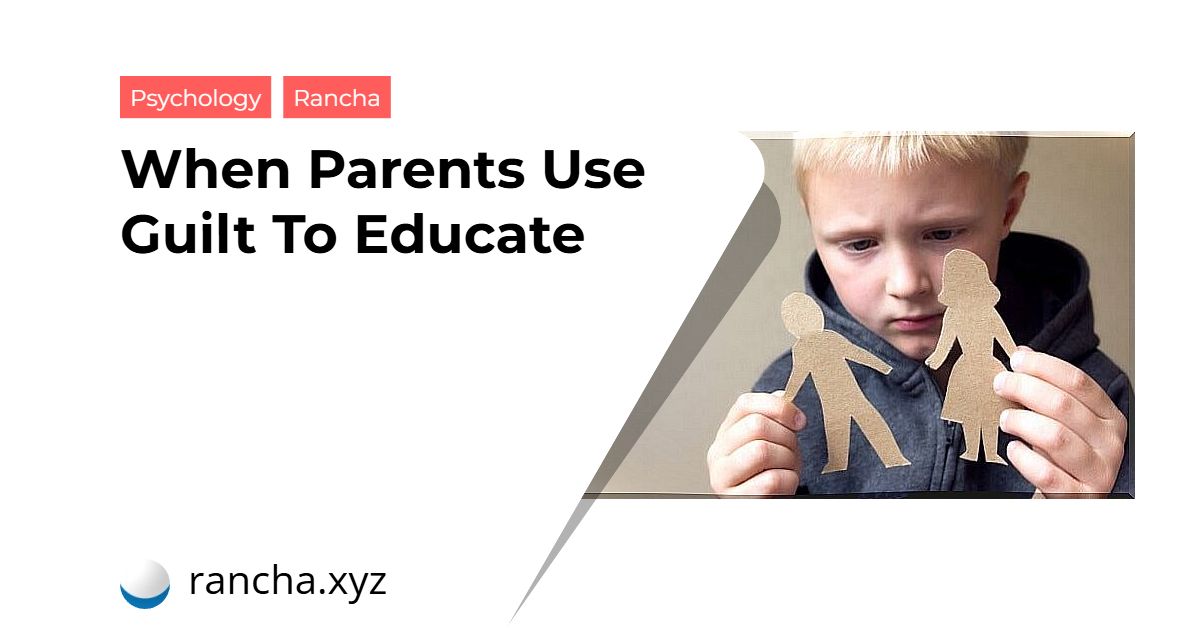There are still many parents who think it is valid to use guilt to educate. They think that reward and punishment are the basis of good training. This is eventually true, especially at very young ages, but it must also be understood that it is a step that must be overcome.
Guilt gives way to emotional discomfort. It is born from a symbolic and social sanction. However, guilt does not lead to responsibility. It also does not promote autonomy, nor does it allow each person to freely choose the values they believe in or not. By using guilt to educate, the child is not actually educated, but the child is conditioned.
It is true that using guilt to educate increases your control over your child. This makes the job of an authoritarian parent easier. The little one is filled with fears, moral conditioning and, therefore, becomes more manageable. He obeys more easily because his will becomes weaker. It leaves less of the norm, because the fear of doing it is very strong. Then you will become a docile person, but neither free nor happy.
The guilt to educate ends with self-esteem
A child needs guidance, but it must be offered on terms that allow him to assert himself. The guilt used to educate does the opposite: it makes the child feel that what he does, feels, desires or thinks is not acceptable.

Let’s look at this with an example to understand better. The child does not want to eat vegetables. Her flavor usually has a bitter touch that she doesn’t like. From a perspective that uses guilt to educate, you will say that a good child should eat what is served, without protest. From an approach that seeks reassurance, it will say that champions eat vegetables because they provide a lot of strength.
No child acts to annoy their parents. On the contrary. What she wants is to please them and make them feel good about her. Their emotional immaturity is what makes them not conform to certain precepts or norms. What should be done is to help them understand the reason for these precepts.
Guilt prevents the development of conscience
Educating is not teaching a child to blindly obey the rules. Educating with guilt leads precisely to this. This leads the child to believe that it is necessary to act in accordance with what authority figures dictate. This makes them think that the figures are unquestionable, and that questioning them leads to immoral conduct.
What is achieved is to mark a break between want and duty. The last is what always has to prevail. But the most serious part of this is that this approach contributes to deteriorating critical capacity. In this way, a real awareness of the acts never appears.

There is awareness in freely choosing how to act, when it is the proper reason that determines what is good and what is bad. If a person has a wide margin of awareness, he can hardly be manipulated, reduced or used. But if someone is constantly conditioned by guilt, he doesn’t really appreciate his reasoning. It always depends on the approval of an authority to act.
Educate without guilt
At birth, human beings are self-centered. For a baby and toddler, there is no possibility of seeing the world beyond their own needs. At this point, the role of parents is fundamentally to meet these needs and allow the child to feel in a safe environment. This will sow a seed of confidence and self-love.
With weaning and control of the sphincters, the long road to insertion starts in a normative framework, that is, in a culture. It is obvious that limitations and restrictions cause frustration and therefore rejection. The child finds it difficult to assimilate that the world does not begin or end with him. This creates friction that, in any case, should not lead to using guilt to educate.

In this long process of development, the ideal is for parents to teach the child to think according to the consequences of their actions. For this, it is important that they help her to recognize her emotions, her desires, their limits and the reasons for them. The margin for learning to choose, to decide, must be gradually implemented. These processes never take place perfectly, it is enough that the intention to maintain them is genuine and constant.
 rancha.xyz Be free to choose their own route to self-knowledge, health and balance of body and soul.
rancha.xyz Be free to choose their own route to self-knowledge, health and balance of body and soul.




